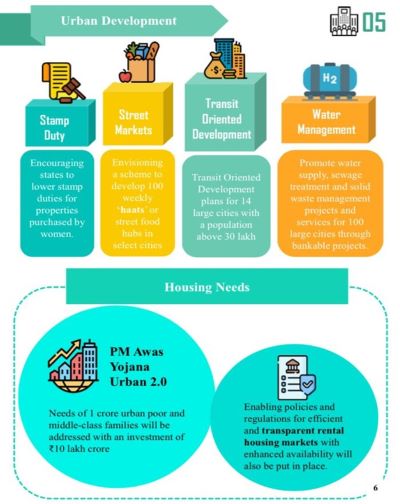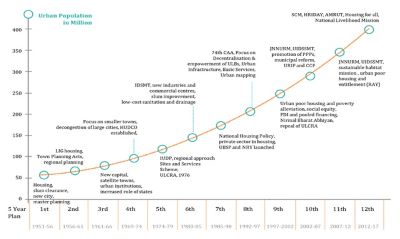Context:
Cities are home to about 50 crore people, accounting for about 36% of India’s population. The urban population has been growing at a steady pace of 2% to 2.5% annually. The ever-growing pace of urbanisation in India calls for sustained investments, with a vision and determination. The maiden Budget of the new government has recognised cities as the growth hubs and offered many options and opportunities for the planned development and the growth of cities.
Housing Development
Pradhan Mantri Awas Yojana (Urban) Expansion
The Pradhan Mantri Awas Yojana (Urban) has been in effect since 2015, providing approximately 85 lakh housing units for the Economically Weaker Sections (EWS) and Middle Income Groups (MIG) with an investment of around ₹8 lakh crore. Of this amount, a quarter is contributed by the central government, while the rest comes from beneficiaries and State governments. The Budget aims to further this initiative by supporting the construction of an additional one crore housing units in urban areas, with an investment of ₹10 lakh crore. This includes central assistance of ₹2.2 lakh crore over the next five years, and ₹30,171 crore allocated for the current fiscal year. Part of this funding will be used to provide interest subsidies to make loans more affordable.
Rental Housing for Industrial Workers
The Budget introduces new rental housing options for industrial workers, designed as dormitory-style accommodations. These will be developed through a public-private partnership (PPP) model, with financial support under the Viability Gap Funding (VGF) scheme, covering up to 20% of the cost from the central government, with possible matching support from State governments.
Atal Mission for Rejuvenation and Urban Transformation (AMRUT)
The Budget allocates ₹8,000 crore to the Atal Mission for Rejuvenation and Urban Transformation (AMRUT). Although this amount might seem modest, the Finance Minister has introduced the VGF window for projects undertaken as commercial ventures in PPP mode. This should accelerate the development of essential infrastructure like water supply, sanitation, roads, and sewerage systems in cities.
Investment in Infrastructure
A significant investment of ₹11.11 lakh crore is earmarked for capital expenditure, which includes infrastructure projects beyond highways. Cities can also benefit from this investment. Additionally, ₹1.50 lakh crore is provided to States as an interest-free loan for infrastructure development, which can be utilised by cities as well.

Urban Planning and Development
Smart Cities Mission and New Initiatives
The Smart Cities Mission, launched in 2015, had a budget of ₹8,000 crore in 2023-24, but this has been reduced to ₹2,400 crore for 2024-25 to cover existing commitments. However, a new initiative, the National Urban Digital Mission (NUDM), has been introduced with a provision of ₹1,150 crore. This mission focuses on digitising property and tax records, including GIS mapping, which will aid urban local bodies in better financial management and assist property owners.
City Planning and Transit Development
The Budget emphasises planned city development with a normal ‘Finance Commission Grant’ of ₹25,653 crore for municipalities. An additional ₹500 crore is allocated for incubating new cities. Cities are encouraged to adopt transit-oriented development, with transit hubs surrounded by dense development to avoid traffic overload. The Budget also supports the development of mass rapid transit systems and encourages electric bus systems, providing ₹1,300 crore for their implementation. Although electric buses are more expensive upfront, this funding aims to make them a viable option.
Challenges and Solutions
Solid waste management (SWM) remains a significant challenge for most cities. The Budget proposes a special thrust to develop bankable SWM projects in collaboration with State governments and financial institutions. The VGF can also be used for this purpose. Successful examples, like Indore in Madhya Pradesh, demonstrate that SWM can be financially viable.
Street Vendors Act and Development of Street Hubs
The Street Vendors Act, 2014, aims to regulate street vending and protect vendor rights. The Budget proposes the creation of 100 weekly ‘haats’ or street food hubs in select cities. States are encouraged to extend this initiative and develop street-vending plans and hubs based on local needs.
● Promote Inclusive Urban Development: Embrace a holistic strategy for urban development that involves all relevant sectors and emphasises inclusivity to ensure comprehensive urban growth.
● Leverage Scientific Data Methods: Utilise scientific data and methodologies to evaluate and monitor the results of both state and central schemes, ensuring that decisions are based on solid evidence.
● Foster Active Citizen Participation: Enhance citizen involvement in civic matters through both physical and digital platforms to ensure that urban governance aligns with the needs and priorities of the community.
● Emphasise Strategic Investment: Invest in strategic planning and foster private sector participation. Implement coordinated actions across various agencies to effectively tackle the challenges faced by cities.
The Budget has made extensive provisions for urban development, including financial and procedural support for planned urbanisation. However, the successful implementation of these strategies will depend on the vision and determination of municipalities, State governments, and citizens. The active participation of citizens will be crucial for the success of any urban development strategy.
|
Probable Questions for UPSC Mains 1. Discuss the key initiatives proposed in the Union Budget 2024-25 to address housing and infrastructure challenges in Indian cities. How do these initiatives align with the broader goals of urban transformation and sustainable development? (10 Marks, 150 Words) 2. Evaluate the role of citizen participation in the successful implementation of urban transformation strategies. How can cities ensure that their development plans reflect the needs and priorities of their residents? Provide examples of successful urban planning initiatives that have effectively engaged citizens. (20 Marks, 250 Words) |
Source: The Hind







